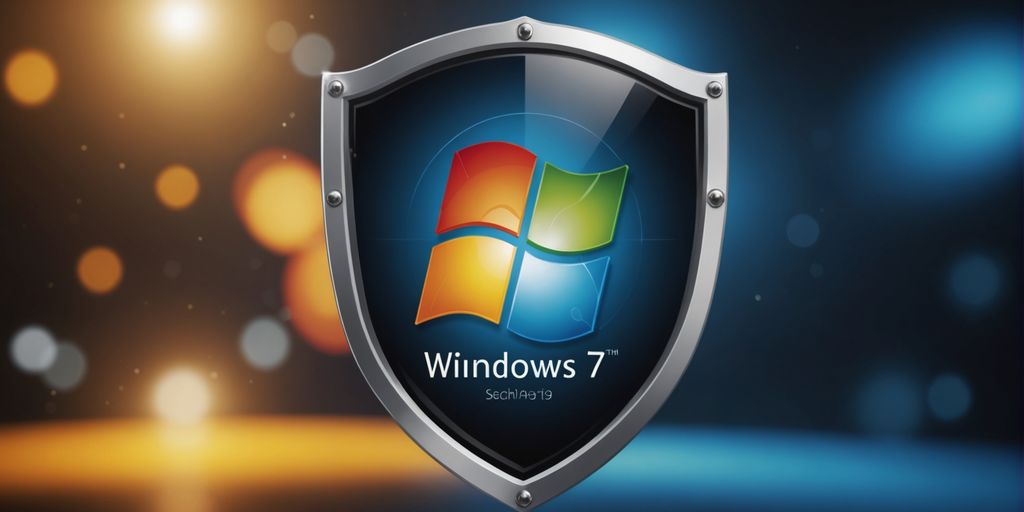Even though Microsoft stopped supporting Windows 7, many people still use it. This operating system, which came out in 2009, is the third most popular in the world. Why do so many people stick with it? Let’s explore the reasons behind its lasting appeal.
Key Takeaways
- Many users find Windows 7’s interface easy to use and familiar.
- Windows 7 works well with older software and hardware, which is important for some users.
- Upgrading to a new system can be expensive, making people stick with what they have.
- Some users feel they have more control over security updates with Windows 7.
- Nostalgia and personal preference play a big role in why people continue to use Windows 7.
The Enduring Popularity of Windows 7

A Look at the Numbers
Windows 7, despite being released in 2009, still holds a significant user base. It’s the third most popular operating system in the world (behind Windows 10 and Windows 11). Even though Microsoft ended support for it in 2020, many users haven’t made the switch to newer versions. This enduring popularity is evident from various surveys and data analytics, showing that a substantial number of people continue to use Windows 7 on their machines.
Why People Love It
There are several reasons why people stick with Windows 7. For many, it’s about familiarity and comfort. They know how to navigate the system and don’t want to learn something new. Others appreciate its reliability and performance over time. Additionally, some users have older hardware or software that works perfectly with Windows 7, making them hesitant to upgrade. The combination of these factors contributes to the lasting appeal of this operating system.
The enduring popularity of Windows 7 highlights how important user experience and reliability are to many people. Even without official support, the operating system continues to be a favorite for a significant number of users.
User Interface and Usability
Familiarity and Comfort
Windows 7 has a user interface that many people find familiar and comfortable. The layout is straightforward, making it easy for users to find what they need. The Start menu, taskbar, and desktop icons are all arranged in a way that feels intuitive. This familiarity reduces the learning curve for users who have been using Windows for years.
Ease of Navigation
Navigating through Windows 7 is a breeze. The operating system is designed to be user-friendly, with clear menus and simple options. Users can easily switch between applications using the taskbar, and the Start menu provides quick access to frequently used programs. This ease of navigation is especially important for those who use their computers for work or school, as it allows them to be more productive.
The simplicity of Windows 7’s interface makes it a favorite among users who prefer a no-nonsense approach to computing.
In summary, the user interface and usability of Windows 7 are key reasons why it remains popular. The familiar layout and easy navigation make it a reliable choice for many people, whether they are using a computer monitor or a computer mouse.
Compatibility with Older Software and Hardware
Legacy Software Support
One of the main reasons people stick with Windows 7 is its compatibility with older software. Many users have specific programs that only run smoothly on this operating system. For instance, some older versions of Adobe Creative Suite work perfectly on Windows 7 but may not function well on newer systems. This is especially true for specialized software used in industries like manufacturing, where upgrading could mean losing access to essential tools.
Hardware Compatibility
Another big factor is hardware. Many older devices, like certain computer printers, don’t have drivers for newer operating systems. This means that upgrading to a new OS could render these devices useless. For example, some peripherals released as late as 2016/2017 may not be supported by the latest operating systems. This is a significant concern for users who rely on these devices for their daily tasks.
Upgrading isn’t always about getting the latest features; sometimes, it’s about keeping what already works well.
In summary, the need to maintain compatibility with both older software and hardware is a key reason why many people continue to use Windows 7. It allows them to avoid the hassle and cost of replacing perfectly functional equipment and software.
Cost of Upgrading to Newer Systems
Financial Constraints
For many, the cost of upgrading from Windows 7 to a newer system is a big hurdle. Even though Windows 10 upgrades were free for a while, the expense of new hardware can be too much. This is especially true for those who rely on used desktops or refurbished computers. The price of a new system can be a deal-breaker, especially when refurbished laptops or refurbished desktop computers can do the job just fine.
Cost-Benefit Analysis
When thinking about upgrading, people often weigh the costs against the benefits. Here are some points they consider:
- Initial Cost: New systems can be pricey, while refurbished options are more budget-friendly.
- Performance: Will the new system offer a significant performance boost?
- Compatibility: Will all existing software and hardware work with the new system?
- Learning Curve: How much time will it take to get used to the new system?
Many users find that sticking with Windows 7 on their current or refurbished computers meets their needs without breaking the bank.
Security Concerns and Control

User Control Over Updates
One of the reasons some people stick with Windows 7 is the control they have over updates. Unlike newer versions, Windows 7 allows users to decide when and which updates to install. This level of control can be comforting, especially for those who worry about updates causing issues.
Perceived Security Risks
While Windows 7 no longer receives official security updates, many users feel that they can still keep their systems safe. They often use additional security measures like firewalls, antivirus software, and browser extensions to protect their computers. However, it’s important to note that using an outdated system can still pose significant risks.
Some users believe that their own security practices can compensate for the lack of official updates, but this is not always the case.
User Control Over Updates
One of the reasons some people stick with Windows 7 is the control they have over updates. Unlike newer versions, Windows 7 allows users to decide when and which updates to install. This level of control can be comforting, especially for those who worry about updates causing issues.
Perceived Security Risks
While Windows 7 no longer receives official security updates, many users feel that they can still keep their systems safe. They often use additional security measures like firewalls, antivirus software, and browser extensions to protect their computers. However, it’s important to note that using an outdated system can still pose significant risks.
Some users believe that their own security practices can compensate for the lack of official updates, but this is not always the case.
Performance and Stability
System Reliability
Windows 7 is known for its reliable performance. Many users report that their computers run quietly and smoothly, with no signs of slowdown. This consistent performance is one of the reasons why people stick with it. The system’s ability to handle tasks without frequent crashes or errors makes it a favorite among those who value stability.
Performance Over Time
Over the years, Windows 7 has proven to maintain its performance. Unlike some newer systems that may slow down with updates, Windows 7 remains steady. Users appreciate that they can rely on their system to perform well, even after years of use. This long-term performance is a key factor in its enduring popularity.
The computer runs quietly and smoothly, with no sign of slowdown. This consistent performance is one of the reasons why people stick with it.
Sentimental Value and Personal Preference

Nostalgia Factor
For many, Windows 7 brings back fond memories of simpler times. The familiar interface and classic design elements evoke a sense of nostalgia. Users often recall their first experiences with computing, making it hard to let go of an old friend.
Personal Stories
People have unique stories tied to their use of Windows 7. Some remember using it for important projects, while others recall it as the system on their first computer. These personal connections make it more than just an operating system; it’s a part of their history.
The emotional bond with Windows 7 is strong, making it difficult for users to switch to newer systems. This sentimental value often outweighs the benefits of upgrading.
Comfort in Consistency
The consistency of Windows 7 provides a sense of comfort. Users appreciate the predictable performance and familiar layout, which makes daily tasks easier. This comfort level is a significant reason why many stick with Windows 7 despite newer options being available.
Resistance to Change

Fear of the Unknown
Many people are simply afraid of the unknown. They worry that upgrading to a new system might cause them to lose important data or programs. This fear can be a big reason why they stick with what they know. Change can be scary, and for some, it’s just easier to stay with a familiar system.
Comfort in Consistency
Sticking with a system that works is often seen as the best choice. People get used to the way things are and don’t want to deal with the hassle of learning something new. This comfort in consistency is a major factor in why some people continue to use Windows 7. They have a guide to optimize Windows performance by adjusting visual effects, managing maintenance, disabling unnecessary features, keeping the system clean and updated, and ensuring optimal power settings. Why change something that already works well for them?
For many, the idea of switching to a new system feels like more trouble than it’s worth. They prefer the stability and familiarity of their current setup.
Laziness
Sometimes, it’s just plain laziness. Upgrading takes time and effort, and some people simply don’t want to go through the process. They might think, “If it ain’t broke, don’t fix it.” This mindset can keep people using older systems long after newer ones are available.
Too Busy to Upgrade
Life can be hectic, and not everyone has the time to sit down and upgrade their system. Between work, family, and other responsibilities, finding the time to upgrade can be tough. Some people are just too busy to deal with the hassle of upgrading, so they stick with what they have.
Community and Support Networks
Online Forums and Help
Windows 7 users have built a strong community over the years. Online forums are filled with helpful tips and tricks for solving common problems. These forums are a great place to ask questions and get advice from other users who have faced similar issues. The sense of community makes it easier for users to stick with Windows 7.
Shared Tips and Tricks
In these forums, users often share their favorite tips and tricks. Whether it’s a shortcut for a task or a way to improve performance, there’s always something new to learn. This sharing of knowledge helps everyone get the most out of their Windows 7 experience.
The Microsoft Support and Recovery Assistant works by running tests to figure out what’s wrong and offers the best solution for the identified problem.
The community’s willingness to help each other out is one of the reasons why Windows 7 remains popular. People feel more confident using the system when they know they can get help if they need it.
Comparisons with Windows 10
User Experience Differences
When comparing Windows 7 and Windows 10, many users find that Windows 7 offers a more user-friendly interface. They often describe it as simpler and easier to navigate. On the other hand, Windows 10 brings a modern look and feel, but some users feel it can be overwhelming with its numerous features and settings.
Feature Comparisons
Windows 10 comes packed with new features like Cortana, virtual desktops, and a more integrated experience with Microsoft services. However, Windows 7 fans appreciate the stability and control they have over their system, especially when it comes to updates. They feel that Windows 7 allows them to manage their computer without constant interruptions.
For those who prefer a straightforward and stable system, Windows 7 remains a favorite. They value the control and familiarity it offers, making it a tough choice to switch to Windows 10.
Here’s a quick comparison of some key features:
| Feature | Windows 7 | Windows 10 |
|---|---|---|
| User Interface | Classic and simple | Modern and feature-rich |
| Virtual Desktops | Not available | Available |
| Cortana | Not available | Available |
| Update Control | User-controlled | Automatic updates |
| Stability | Highly stable | Improved but complex |
In summary, while Windows 10 offers many new features and a modern interface, Windows 7’s simplicity and stability continue to make it a popular choice for many users.
The Role of Businesses and Enterprises
Enterprise Software Dependencies
Many businesses still rely on Windows 7 because their enterprise software is specifically designed for it. Upgrading to a new operating system can mean costly updates or replacements for these critical applications. Sticking with Windows 7 ensures that everything runs smoothly without unexpected hiccups.
Cost of Transition
Switching to a newer operating system isn’t just about buying new software. There’s also the cost of training employees, potential downtime, and the need for new hardware. For many companies, the benefits of upgrading don’t outweigh these expenses. They prefer to stay with a system that works and is familiar to their staff.
For some businesses, the stability and reliability of Windows 7 make it a more attractive option than the unknowns of newer systems.
Wrapping It Up
In the end, the continued popularity of Windows 7 boils down to a few key reasons. Many users appreciate its familiar and user-friendly interface, while others find it more stable and reliable compared to newer versions. The cost of upgrading and compatibility issues with older hardware and software also play significant roles. Despite Microsoft’s efforts to move everyone to Windows 10, a dedicated group of users remains loyal to Windows 7, valuing its dependability and simplicity. It’s a classic case of “if it ain’t broke, don’t fix it.”
Frequently Asked Questions
Why is Windows 7 still popular?
Many people find Windows 7 easy to use and familiar. It also works well with older software and hardware.
Is Windows 7 better than Windows 10?
Some users think Windows 7 is better because they like its user interface and stability. They also feel they have more control over updates.
How many people still use Windows 7?
According to some reports, nearly 10% of Windows PC users still run Windows 7.
Is it safe to use Windows 7?
Using Windows 7 can be risky because Microsoft no longer provides security updates for it. This can make your computer more vulnerable to viruses and other threats.
Can I upgrade from Windows 7 to Windows 10?
Yes, you can upgrade from Windows 7 to Windows 10, but it might cost money. You should also check if your computer meets the system requirements for Windows 10.
Why do businesses still use Windows 7?
Some businesses stick with Windows 7 because their software and hardware are compatible with it. Upgrading can also be expensive and time-consuming.
Is it expensive to upgrade from Windows 7?
Upgrading can be costly. You might need to buy a new license for Windows 10 and possibly new hardware if your current computer isn’t compatible.
What are the risks of not upgrading from Windows 7?
Not upgrading means you won’t get security updates, making your computer more vulnerable to malware and other security threats.








